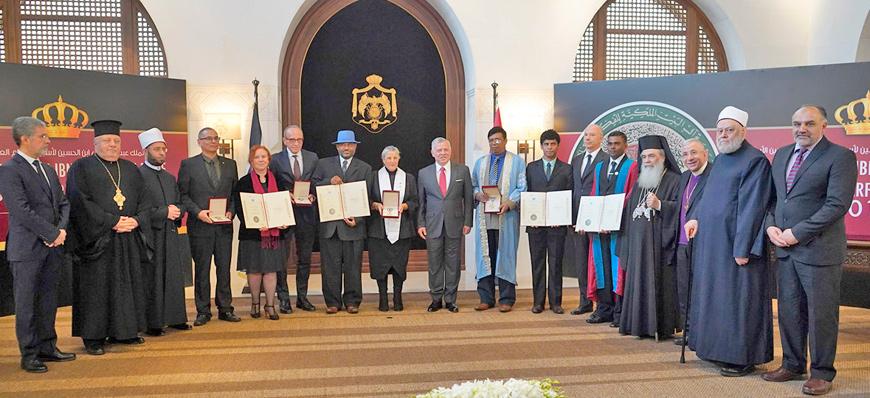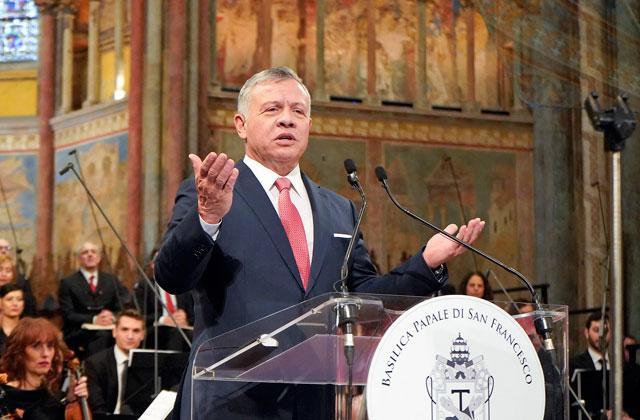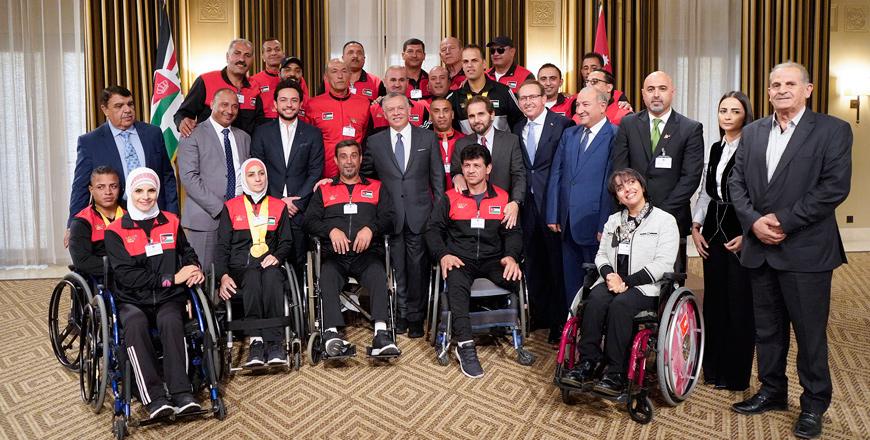You are here
King announced 2018 Templeton Prize Laureate for interfaith, intrafaith harmony efforts
By JT - Jun 28,2018 - Last updated at Jun 28,2018
AMMAN — His Majesty King Abdullah was announced on Wednesday as the 2018 Templeton Prize Laureate, for his efforts to promote religious harmony within Islam and between Islam and other religions, according to a statement by Templeton Foundation.
“The King’s long quest to promote peace-affirming Islam gained momentum in 2004 in the wake of the Iraq war when the fragile unity of Sunni and [Shiite] Muslims in the region was at substantial risk,”
the statement said.
During that period, it continued, increasingly vocal rhetoric from marginal Islamic groups threatened to create deeper schisms within the Islamic community.
In the face of these challenges, the King launched the breakthrough Amman Message that articulated a clear understanding of the central elements of Islam, and affirmed that terrorism and violence have no place in the religion, a Royal Court statement said.
The following year, “he assembled 200 scholars from 50 countries representing all schools of jurisprudence in Islam who, under his guidance, issued a declaration now known as the ‘Three Points of the Amman Message.’ The first point recognised the validity of all eight legal schools of Islam. The second forbade declarations of apostasy (known as takfir) between Muslims, while the third established conditions for issuing fatwas, Islamic legal rulings. The Three Points have come to represent an unprecedented and almost unanimous religious and political consensus by Muslims around the globe. Since then, more than 450 Islamic scholars and institutes from more than 50 countries have endorsed it.”
Highlighting another interreligious initiative in 2006, the foundation said that King Abdullah supported the initiative known as “A Common Word between Us and You”, which led to a 2007 open letter from Islamic religious leaders to Christian religious leaders. A Common Word contains a call for peace and harmony between Muslims and Christians based on the twin commandments shared by both faiths, namely “love of God” and “love of the neighbour”. “Originally signed by 138 Muslim leaders and scholars from 52 countries, it now has more than 400 signatories including nearly 300 endorsements from a wide range of Christian leaders, and is considered by many to be the most important Muslim theological initiative towards Christians.”
The statement also highlighted the UN World Interfaith Harmony Week initiative by the King, which led to the UN General Assembly resolution expanding the twin “love” commandments by adding “love of God or love of the good” to “love of one’s neighbour”, thus, including all people of goodwill, with or without faith.
Adopted unanimously by the UN General Assembly, the resolution established the first week of February as UN World Interfaith Harmony Week to stress the moral imperative of promoting and understanding the values of peace inherent in all religions. It is generally acknowledged as the first and only time that the United Nations approved a resolution explicitly citing belief in God.
“Through these groundbreaking initiatives and many others, King Abdullah has led reclamation of Islam’s moderate theological narrative from the distortions of radicalism.”
The Templeton Prize is one of the world’s largest annual individual awards and honours a person who has made an exceptional contribution to affirming life’s spiritual dimension, whether through insight, discovery, or practical works.
Established in 1972 by the late global investor and philanthropist Sir John Templeton, the prize is a cornerstone of the foundation’s international efforts to serve as a philanthropic catalyst for discoveries relating to the deepest and most profound questions facing humankind. The foundation supports research on subjects ranging from complexity, evolution, and emergence to creativity, forgiveness and free will.
In a videotaped message on www.templetonprize.org, Heather Templeton Dill, president of the John Templeton Foundation and grand-daughter of Sir John Templeton, said: “His Majesty King Abdullah’s work is indeed inspiring. He has underscored the importance of Islam’s diversity rather than seeking to invent or enforce uniformity where none exists. He has built upon the power of principled pluralism to extend religious harmony among the 1.8 billion followers of Islam, the world’s second largest religion, so that each can recognise one another as Muslims.”
She added: “King Abdullah offers the world the true definition of a spiritual entrepreneur, a person shaped by temporal and political responsibilities, yet who holds both the belief and free expression of religion as among humankind’s most important callings.”
“Beyond his activities within Islam and between Islam and other faiths, the King has also tirelessly defended and supported refugees from across the Middle East, hosting and offering safe haven for millions fleeing conflict. Additionally, he has protected Jerusalem’s Islamic and Christian holy sites at considerable personal and monetary expense,” the foundation said.
His Majesty King Abdullah, in his videotaped acceptance of the prize on www.templetonprize.org, said: “Our world needs to confront challenges to our shared humanity and values. They are the very ground of the coexistence and harmony our future depends on. And this is why I feel it is so urgent to promote tolerance and mutual respect, support inclusion and hope, speak out against Islamophobia and other wrongs, and make our values a real force in the daily life of the modern world.”
His Majesty continued: “The Templeton Prize has blazed a trail for all of us, by upholding the importance of spiritual discovery and spiritual values across religions. And I am pleased and humbled to share your path. It is my deep and sincere hope that this award will continue to promote love and harmony within and among religions, and that in doing so, will invite the blessings of God upon us all.”
In his letter endorsing King Abdullah‘s nomination for the Prize, the Very Reverend Professor Iain R. Torrance, Pro-Chancellor of the University of Aberdeen, wrote: “The immensely important work of King Abdullah II lies in his decisive leadership and convening authority in worldwide Islam to call a principled halt to sectarianism and to mutual denunciation”.
The King’s work, Torrance added, epitomises progress “in the sense that through scholarship, example, encouragement, and publication, King Abdullah has offered the inherently flexible structures of Islam space to re-set and look again at matters of justice, interfaith relations and neighbourliness”.
In her reference letter, Georgette F. Bennett, president and founder of the Tannenbaum Centre for Inter-religious Understanding, a New York-based organisation dedicated to fighting religious prejudice, stressed the King’s efforts: “His leadership. His courage. His grace under fire. His unwavering commitment to expanding the boundaries of interreligious understanding.”
The statement also underlined the King’s efforts to restore and develop the Christ Baptism Site, also known as Bethany beyond the Jordan, on the Jordan River’s east bank, “which most Christians consider the site of Christ’s Baptism”, which UNESCO unanimously approved as a World Heritage Site in 2015.
“He has ensured that various denominations received blocks of land to build churches there, and a conference centre opened in 2012.”
The statement added that King Abdullah’s leadership also has guaranteed safe haven for Jordan’s ethnic and religious groups, including several denominations of Christians who are free to worship according to their own traditions. Moreover, it said, Jordan has hosted waves of millions of refugees since its independence in 1946 — Palestinians, Iraqis, Libyans, Yemenis and, most recently, Syrians fleeing the Syrian civil war — representing the embodiment of the Islamic requirement to care for strangers and affirm the dignity of life.
King Abdullah joins a group of 47 Prize recipients including Mother Teresa, the Dalai Lama (2012) and Archbishop Desmond Tutu (2013).
His Majesty King Abdullah II will be formally awarded the Templeton Prize in a public ceremony in Washington, DC, on November 13, the foundation announced.
Related Articles
AMMAN — His Majesty King Abdullah on Wednesday attended the 2019 King Abdullah II World Interfaith Harmony Week Prize ceremony at Al Hussein
AMMAN — Since the Accession to the Throne, His Majesty King Abdullah has institutionalised a policy of interfaith dialogue, earning the King
Amman — His Majesty King Abdullah on Thursday departed on a working visit to Washington, DC, during which His Majesty will be receiving the



















